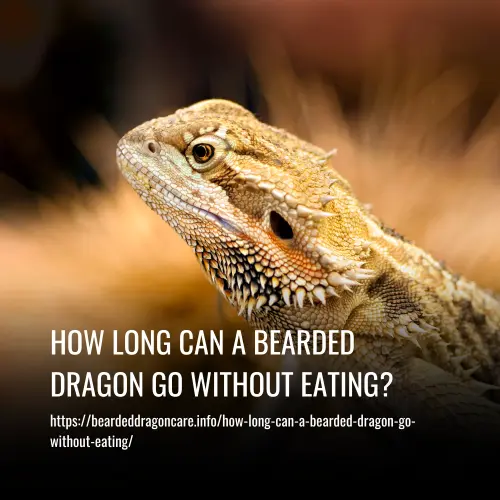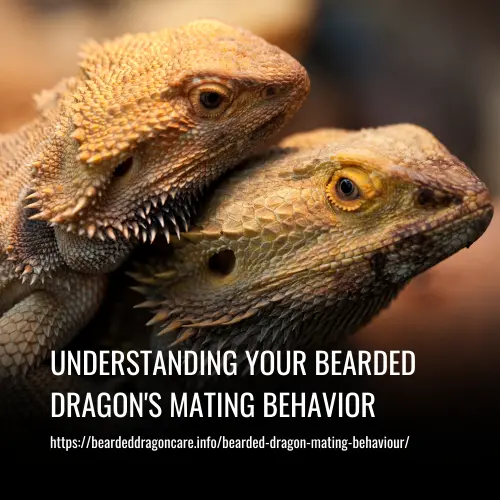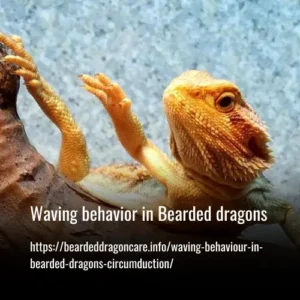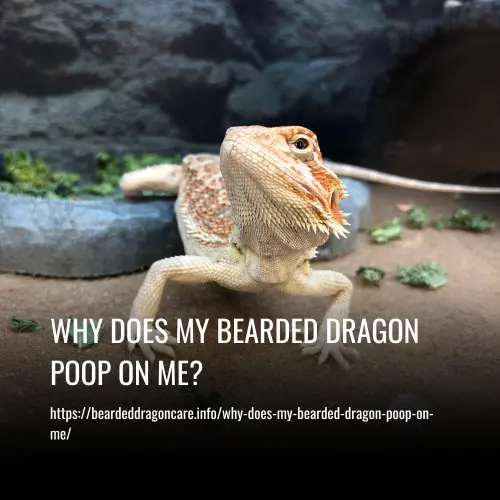Bearded dragons are fascinating creatures that make great pets. They are easy to take care of and have a friendly temperament. However, as a new owner, you may be wondering how long your bearded dragon can go without eating.
It is essential to know how long your bearded dragon can go without food to ensure their health and wellbeing. In this article, we will discuss the factors that can affect how long a bearded dragon can go without eating and provide you with some tips to keep your pet healthy.

How Long Can Bearded Dragons Go Without Eating
A bearded dragon’s ability to go without eating depends on their age, health, and activity level. Adults can go up to two months without food, but this is not recommended as it can lead to health problems.
Juveniles can go up to a month without food but may suffer from stunted growth. Babies should not go more than a few days without food as they need protein and calcium for proper growth and to avoid metabolic bone disease.
How Long Can A Bearded Dragon Go Without Eating In the Wild
Bearded dragons can survive without food for 1-3 months in the wild due to their ample fat reserves and ability to reduce their energy demands during the brumation period. However, juvenile bearded dragons cannot survive that long without food as they do not have enough fat reserves and can only last about a week before needing to eat.
This ability to survive without food for extended periods of time is due to their evolution in the harsh desert and subtropical regions of Australia where finding food is difficult and there is a high risk of being preyed upon.
How Long Can A Bearded Dragon Go Without Eating In Captivity
While bearded dragons in the wild can go without food for up to three months, it’s not recommended to let your pet bearded dragon go without food for that long. Baby bearded dragons need food 3-5 times a day, juvenile beardies need food at least 2-3 times a day, and adult beardies usually survive on one meal per day.
While a baby or juvenile bearded dragon can go for a few days or even weeks without food, it’s not recommended to let them go without food as they need a constant supply of protein and minerals to grow up healthy. Adult bearded dragons can go for months without eating, but it’s not recommended to leave them without food for more than a week if they’re not in their brumation period.
Reasons Why A Bearded Dragon Is Not Eating
When it comes to food survival for bearded dragons, the reason for not eating is a significant variable. Juveniles can only go a few days to a week without food, but the reason for not eating can impact survival as well.
1. Wrong Temperatures
If the temperature in the basking spot is too low, bearded dragons may stop eating as they won’t feel well, or they won’t digest properly. They need a higher heat to help them digest, as they’ve evolved to rely on extreme heat for many bodily processes.
An adult bearded dragon could survive a couple of weeks without food due to this issue, but it should resolve within a couple of days if the temperature is adjusted to around 105° degrees Fahrenheit (41 °C).
2. Home Changes
Bearded dragons are known to be sensitive to changes in their environment, particularly in regards to their living space. If their tank is changed or new furniture is added, they may stop eating as they don’t feel safe in their space.
This behavior should resolve itself in a few days, but if it doesn’t, it’s important to get your pet checked out. An interruption to their daily routine may lead to a hunger period that lasts for a maximum of two weeks.
3. Increased Stress
If your bearded dragon is experiencing more stress, it may refuse to eat. This could be due to constipation or feeling threatened by its environment. Ensure that its location is safe, and it may start eating again. In cases of high stress, it should only go without food for a week at most, as being stressed causes it to use more energy quickly.
4. New Diet/Foods
Bearded dragons can become picky eaters and get stuck in a rut when it comes to their food selection. Consuming insects that have a high fat content or fruits that contain high levels of sugar may lead to a decrease in overall appetite.
This is especially true if the food is new to them. Don’t give up, keep offering them the food until they get hungry enough to eat. It’s normal for them to refuse to eat new food for a week on end.
5. Brumation
One possible reason for a lack of appetite is brumation, which is essentially hibernation for bearded dragons. During this time, they may not eat or drink for weeks or even months.
If the tank temperature has decreased or a year has passed since the last brumation, it can be inferred that the dragon is in a state of brumation.
6. Sickness
Another potential cause of a lack of appetite is sickness. If your bearded dragon is exhibiting other symptoms such as visible injury, foaming, glassy eyes, lack of movement, lack of droppings, or discoloration, they may be sick. In this case, it’s important to take them to the vet as soon as possible to receive proper treatment.
Regardless of the reason for the lack of appetite, it’s important to monitor your bearded dragon closely and take action if necessary. Providing proper care and addressing any issues promptly can greatly improve their chances of survival.
7. Aging
As bearded dragons age, their metabolic rate decreases which leads to a decreased need for food compared to when they were younger.
They may also become more selective about what they eat, preferring certain foods over others. It’s important to adjust their diet accordingly and provide them with a balanced and nutritious meal plan.
8. Shedding
Shedding is a natural process that can cause discomfort and irritation in some bearded dragons, especially around their eyes and mouth. During the shedding process, reptiles may experience a decreased appetite until the shedding is complete.
Baby dragons shed more often because they grow quickly. Ensuring their habitat is properly humidified and providing them with a shallow water dish can help ease the shedding process and encourage them to eat.
How To Encourage Your Bearded Dragon To Eat
If your bearded dragon is not eating, it’s important to address the issue to ensure their health and well-being. Here are some tips to stimulate their appetite:
1. Check Lighting and Temperature
Make sure your bearded dragon’s basking spot is warm enough and their UVB light is working correctly. Adjusting their lighting and temperature can help reduce stress and improve appetite.
One option to consider is altering the light cycle to simulate seasonal changes and prompt their innate behaviors.
2. Offer a Variety of Foods
Bearded dragons require a varied diet with insects, veggies, fruits, and supplements. Try offering a variety of foods, including different types of insects and greens, to keep their diet interesting.
Avoid feeding them foods that are high in oxalates or goitrogens, as these can interfere with calcium absorption or thyroid function. Dusting their food with calcium and vitamin supplements can also help prevent nutritional deficiencies.
3. Hand-Feeding
Bearded dragons may like eating from your hand instead of a bowl. Feed them with tweezers or your fingers, being gentle and careful not to harm yourself or them.
4. Entice them with Movement
Bearded dragons like moving prey more than dead ones. Move the insects with tweezers or shake the bowl to get their attention. One option is to place insects outside of the tank for the reptiles to hunt.
5. Soak them in Warm Water
Giving your bearded dragon a 10-15 minute soak in warm water once a week can aid in hydration and promote bowel movement. This method may be helpful in addressing impaction and shedding issues if they are present.
How Often Do Bearded Dragons Need to Eat
The feeding frequency of a bearded dragon is determined by their age and size. Young bearded dragons require more protein than greens, so they need to be fed more often. As they grow, they require less protein and more greens.
Generally, they should be fed a diet of live insects and mealworms for protein and vegetables, vegetation, and fruits for greens. Younger bearded dragons need to be fed more often than adults. A healthy diet of greens and proteins sets them up for a longer life span. Take a look at this table for a quick reference:
| Age | Diet Ratio | Amount | Frequency |
| <2-3 months | 70% Insect 30% Veg | 30-80 insects total per day | 3-5 feeding times per day |
| 3-8 months | 70% Insects 30% Veg | 30-80 insects total per day | Two feeding times per day |
| 8-12 months | 70% Insects 30% Veg | 30-80 insects total per day | One feeding time per day |
| One year + | 30% Insects70% Veg | 50 insects total per week | One day salad, One day insect, One day nothing and repeat |
How Often Do Bearded Dragons Eat During Brumation
Bearded dragons can go weeks without eating during brumation, but they may wake up a few times to eat and drink. In their natural habitat, they forage for food and eat in small portions. However, in captivity, they are not free feeders, so it’s easy to monitor their food intake.
Even if they’re not eating, it’s important to provide them with clean, fresh water every day. Brumation varies depending on where you live, as dragons can sense when the colder seasons are approaching.
Going Without Food During Brumation
During brumation, Bearded Dragons may not want to eat at all and can go without food for up to two months. This is natural and part of the process. It’s important to provide fresh water for them but never force feed them as this can lead to health problems such as rotting food in their gut or impaction.
Basking lamps are not needed during brumation as they use less energy. Let the natural process take place and your Dragon will let you know when they are ready to eat again.
What If You Forget to Feed Your Beardie
Bearded dragons should be fed in sessions of 5-10 minutes, especially when they are younger. However, if you forget to feed your adult bearded dragon for a few days, they will be fine as long as they have clean, fresh water.
Consider using an automated water supply or timed mister if you will be away for a while to ensure your bearded dragon stays hydrated until their next feeding. Don’t leave food in their enclosure as it may decompose or attract pests and parasites.
What If Your Bearded Dragon Won’t Eat
Bearded dragons may stop eating for different reasons. Check the tank temperature and humidity, and change the bulbs in your heat lamp and UVB dome if necessary. If they are brumating, let them be, but if it’s been more than a week since they’ve pooped, they may need to see a vet.
Make sure they’re not competing for food with other dragons in their enclosure, and ensure their environment is stress-free. Keep their enclosure in a quiet, well-lit room away from loud noises, young children, or other pets to prevent stress.
Tips For Bearded Dragons That Won’t Eat
If your bearded dragon isn’t eating, there are a few things you can try. First, give them some time to adjust if they’re new to your home or experiencing stress. Ensure you’re feeding them properly, using a visible food bowl, and offering a variety of foods. If your dragon still doesn’t eat, call a vet to check for any underlying health issues.
Introducing new foods can also help increase their appetite. If all else fails, force-feeding may be necessary, but should only be done under the guidance of a vet. Remember, it’s normal for bearded dragons to go without eating for a few days, so don’t panic if they skip a meal.
Can You Force Bearded Dragons to Eat
It is possible to force-feed a bearded dragon if they have gone two weeks without eating and are not brumating. However, before doing so, it’s important to determine why they’re not eating. This could be due to environmental changes or a health issue. Consult with a vet before attempting to force-feed your dragon. It’s important to use a syringe and not pry their jaw open to avoid hurting them.
Nutritional fluids and walking your dragon on a leash may also help stimulate their appetite. You can also offer “beardie junk food” like sugary fruits or bottled insects to entice them to eat, but be careful not to create a dependence on these foods. After a fasting period, bearded dragons may overeat.
How to Force Feed a Bearded Dragon
Force feeding should only be done in extreme cases where a bearded dragon is visibly weak and becoming alarmingly thin, and only with the approval of a trained reptile vet.
To force feed, securely grip the dragon and gently open its mouth by pulling down on the lower jaw. Then, insert the food. However, force feeding can lead to health issues, so it should only be done as a last resort.
Why Is Going Without Food a Bad Idea For Bearded Dragons
Going without food is a bad idea for Bearded Dragons because they need food to survive and maintain their health. Food provides essential nutrients like proteins, fats, vitamins, and more that are necessary for growth and organ function.
Going without food for a prolonged period can lead to malnutrition and health problems. While adult Bearded Dragons can survive up to 4 weeks without food under certain conditions, it is not recommended to deprive them of a balanced diet on a daily basis.
Why Is Going Without Food a Bad Idea For Baby Bearded Dragons
It’s a bad idea for baby Bearded Dragons to go without food because they need to eat at least 3-5 times a day to support their rapid growth. While they can go 24 hours without food, it’s not recommended as it can hinder their growth and overall health.
Providing them with live feeders, finely chopped vegetables, and vitamin and calcium powder each day is essential to ensure they receive the nutrients they need for a healthy diet.
FAQs
Should I Wake My Bearded Dragon To Eat If They’re Brumating?
It is recommended to let a bearded dragon in brumation sleep and refrain from waking them for meals. During this time, they may seem lazy and sluggish but their bodies are designed to survive without food. Reptiles wake up quickly even during the winter, and they will eat when they need to. It’s best to turn off the lights, lower the temperature slightly (but no lower than 75º F), and leave the tank undisturbed.
Which Foods Keep My Bearded Dragon Fuller For Longer?
To keep your bearded dragon fuller for longer, give them foods that are high in fiber and protein. Dark, leafy greens like collard or turnip greens, bell peppers, and zucchini are good options for their plant content. Insects like crickets or Dubia roaches are great for their protein intake but offer fewer fatty worms like waxworms. It is recommended to limit the intake of sugary fruits for lizards.
What If My Bearded Dragon Doesn’t Like Their Food?
Bearded dragons are not picky eaters, so if your dragon is rejecting their food, it may be a sign of illness or brumation. It is recommended to remove any uneaten food from the enclosure after 15 minutes to prevent contamination. Bearded dragons enjoy live worms and crickets, as well as crunchy foods.
Is It Unhealthy For a Bearded Dragon to Go Without Food?
It is not recommended for a bearded dragon to go without food as it can be detrimental to their health. They need food as an energy source to survive and without it, they can become deficient in essential nutrients like proteins, fats, vitamins, and minerals. The only exception to this rule is during brumation, a natural process where the dragon’s body drip feeds the necessary nutrients until the period is over.
How Often Should I Feed My Bearded Dragon?
The frequency of feeding a Bearded Dragon varies according to their age. Baby and juvenile Bearded Dragons need to eat more frequently to support their rapid growth. As a general guide, feed 3-5 times a day for 0-3 months old, 2-3 times a day for 3-8 months old, and 1 time a day for 8 months old and above.
Conclusion
In conclusion, while bearded dragons can go a surprisingly long time without eating, it’s important to monitor their appetite and behavior closely. If your bearded dragon shows signs of lethargy or lack of appetite for an extended period of time, it’s best to consult with a veterinarian. Bearded dragons can live long and healthy with good care.


